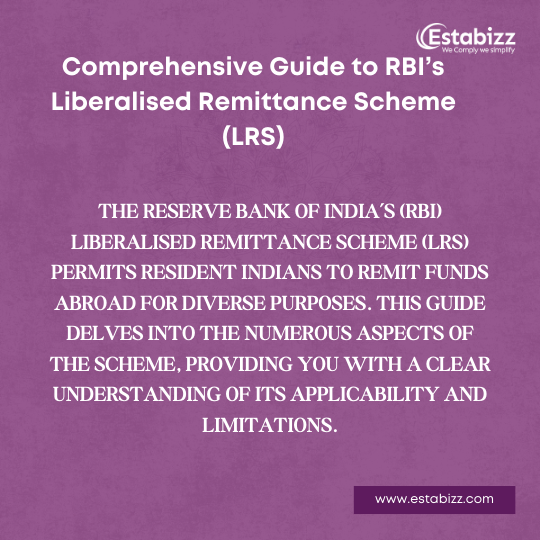Comprehensive Guide to RBI’s Liberalised Remittance Scheme (LRS)
The Reserve Bank of India’s (RBI) Liberalised Remittance Scheme (LRS) permits resident Indians to remit funds abroad for diverse purposes. This guide delves into the numerous aspects of the scheme, providing you with a clear understanding of its applicability and limitations.

Investment Opportunities
Under LRS, resident Indians can invest in various international avenues:
- Listed Foreign Securities: Equity and debt, including mutual funds, exchange-traded funds (ETFs), and venture funds.
- Real Estate: Investment in real estate abroad is allowed with certain restrictions.
- Debt Securities: Investment permitted only in listed debt securities like bonds.
Restricted Investments
- Purchase of physical gold or gold bonds outside India is prohibited.
- Investment in derivatives on overseas exchanges is not allowed.
- Unlisted debt investments, such as US Treasury bills, are not permissible.
For instance, you can invest in bond ETFs but not in US Treasury bills, as they are unlisted.
Permitted Transactions
LRS facilitates various types of international transactions:
- Foreign Trips: Includes personal and business travel.
- Overseas Employment: Funds can be remitted when moving abroad for a job.
- Family Maintenance: Sending money to close relatives who are NRIs.
- Medical Treatment: Covers expenses for medical treatments abroad.
- Education: Remittances to cover studying expenses abroad.
Prohibited Activities
- Creation of leverage in a foreign currency at a foreign bank.
- Investment in under-construction property that surpasses the LRS limit.
- Utilizing LRS funds for fixed deposits abroad, owing to regulatory ambiguities.
- Sending borrowed funds (the remittance must be self-owned for capital account transactions).
- Gifting LRS-funded assets or investments to non-residents is not allowed.
Enhancing Remittance Limits
The existing cap under LRS is $250,000 per financial year per individual. However, there are strategies to extend this limit:
- Financial Year Strategy: Transfer one payment before 31st March and another post 1st April to benefit from two financial years, effectively allowing up to $500,000 in a calendar year.
- Family Member Quota: Combine quotas of family members for a higher remittance limit. Investments must reflect the same proportional contributions from all parties.
- RBI Approval: For amounts exceeding the limit, prior approval from the RBI can be sought, particularly for education, medical treatment, or emigration, which need no prior approval if justified with proper documentation.
Tax Implications
Under the LRS, several tax provisions must be considered:
- A 20% Tax Collected at Source (TCS) is applied to LRS transactions exceeding ₹7 lakh in a fiscal year.
- The TCS credit can be offset against Tax Deducted at Source (TDS) from your salary, facilitating better cash flow management throughout the year.
- Regardless of the exemption threshold of ₹20 lakh, it’s mandatory to disclose all foreign assets in your income tax return, per prevailing legislation.
Documentation: A2 Form
To utilize the LRS, submission of the A2 form to your authorized dealer (AD) is necessary. This form requires you to specify the purpose code of the remittance, with transaction-wise details reported to the RBI daily.
Key Considerations for Businesses Utilizing LRS
Strategic Financial Planning
Engaging in cross-border financial transactions requires meticulous planning:
- Evaluate Investment Opportunities: Assess potential returns and risks associated with international investments.
- Compliance with Regulations: Ensure all transactions adhere to RBI guidelines to avoid potential penalties.
- Documentation: Maintain comprehensive records to support remittances, particularly for investments and large transactions.
Trends and Insights
Staying informed about global financial trends can significantly impact your LRS usage:
- Global Market Dynamics: Understand how shifts in global markets can affect your international investments.
- Currency Fluctuations: Track exchange rate movements to optimize the timing of remittances.
- Tax Legislation Changes: Stay updated with both domestic and international tax regulations to minimize liabilities.
Empowering Your Business with Estabizz
At Estabizz Fintech Private Limited, we are dedicated to empowering your business by offering:
- Expert Guidance: Our team of specialists is well-versed in global financial regulations, providing tailored advice to meet your unique needs.
- Comprehensive Solutions: From investment strategies to compliance checks, we offer end-to-end support to facilitate your international financial activities.
- Global Reach and Local Expertise: With a presence in multiple countries, we deliver localized knowledge and insights, ensuring your business operations are seamless, regardless of location.
Simplifying Complex Concepts
To further aid your understanding, consider these analogies:
- Investment Diversification: Just as diversifying crops can protect a farm from adverse weather, diversifying your investments can safeguard against market volatility.
- Documentation: Think of compliance documentation like a safety net for a tightrope walker, providing essential support in case of missteps.
Summary and Key Takeaways
In summary, the Liberalised Remittance Scheme offers several opportunities and requires careful navigation:
- Permitted Uses: Investments, foreign trips, family maintenance, medical treatments, and education.
- Prohibited Activities: Investing in unlisted debt, derivatives abroad, and creating leverage in foreign currency.
- Enhancing Limits: Utilize financial year strategies, family member quotas, and seek RBI approval when necessary.
- Tax and Documentation: Be aware of the 20% TCS, comply with foreign asset disclosure rules, and ensure all remittances are documented with the A2 form.
Embrace the potential of expanding your business on a global scale with confidence, knowing that Estabizz Fintech Private Limited is your trusted partner. We ensure a smooth journey through the complexities of financial compliance and international expansion.
Estabizz Fintech compiled the material in this article using the most recent Acts, Rules, Circulars, Notifications, Provisions, Press Releases, and material applicable at the time. They ensured the completeness and correctness of the material through due diligence. When using this material, users must consult the relevant, applicable legislation. The given data may change without prior notice and does not constitute professional advice. Estabizz Fintech disclaims all liability for any results from the use of this material.






